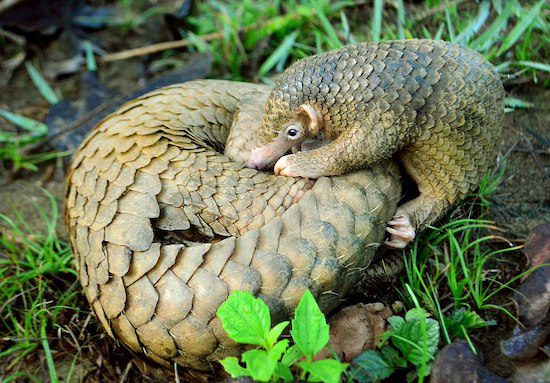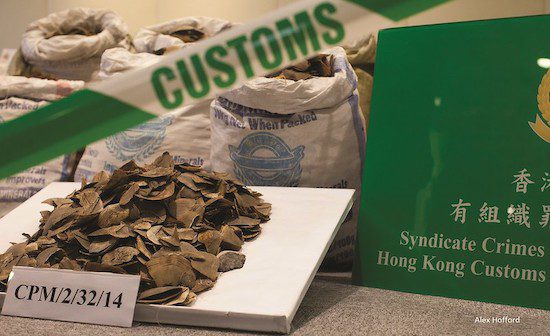


The coronavirus pandemic was likely sparked by the illegal trade in critically endangered pangolins.
By Reynard Loki, Independent Media Institute
Seventy percent of Chinese people falsely believe that consuming pangolins, scale-covered mammals native to Asia and Africa, can cure rheumatism and skin disorders and heal wound infections, according to a 2015 survey. This belief is primarily rooted in traditional Chinese medicine; there is no scientific evidence backing up these claims.
Though it is illegal to poach them, this ongoing demand for their scales and meat has led to steep declines in their numbers, as poachers continue to capture them in the wild and sell them on the black market, like the live animal “wet market” in Wuhan that was the likely origin of the coronavirus outbreak. Scientists believe that the virus originated in bats, then moved to an intermediary host before jumping to a human. That intermediary host was likely a pangolin that was illegally for sale at that market in Wuhan.
The International Union for Conservation of Nature (IUCN) estimates that a pangolin is illegally taken from the wild every five minutes, a shocking statistic that has earned the docile creature the title of “world’s most trafficked animal.” Today, all eight species of pangolin are listed as critically endangered by the IUCN.
“Poachers are killing thousands of pangolins a week, so these unique, scaly mammals desperately need help,” said Sarah Uhlemann, international program director at the Center for Biological Diversity. “If we don’t halt the massive trafficking of pangolin parts, they could vanish in decades.”
Pangolins are easy to capture. They are nocturnal, solitary, and when threatened, they instinctually curl into a ball instead of trying to escape. To make matters worse for them, they are particularly vulnerable to the pressures that come with being poached, as they are sensitive to the stress of being captures and have a slow reproductive rate.
In response to a petition filed by a coalition of wildlife conservation groups in 2015, the U.S. Fish and Wildlife Service found that protections for pangolins may be warranted. But the agency has failed to take any further action—despite mounting evidence of threats to the species. In November, the coalition filed a notice of intent to sue the Trump administration for failing to propose pangolin protections under the U.S. Endangered Species Act.
“The U.S. has to do its part to shut down the global pangolin trade and save these extraordinary animals,” said Uhlemann.

Clearly, international legislation is not enough to protect pangolins due to a lack of enforcement. “This is, in part, due to a lack of political will and a lack of funds,” says Friends of the Earth, an environmental nonprofit fighting to save the pangolin. “Local populations are also not aware or engaged in the drive to conserve these unique animals. Though poaching is the main threat to these species, habitat loss is also negatively impacting populations in both Asia and Africa, mainly because of deforestation.”
Last month, in response to the outbreak, China permanently shut down its $74-billion wildlife-farming industry. This is a positive step, as 75 percent of emerging infectious diseases come from nonhuman animals, according to the Centers for Disease Control and Prevention. But there are concerns that the demand is too high to make the trade in wild animals go away completely.
“A total ban on trading wild animals would criminalize a substantial proportion of the Chinese population, and be untenable,” said Zhao-Min Zhou, a Chinese wildlife-policy researcher, who noted that shutting down animal markets would simply move the trade to the black market. In addition to the ban, authorities must enforce it.
TAKE ACTION: Urge the Chinese and Vietnamese government to enforce the trade ban on pangolins.
Earth | Food | Life (EFL) explores the critical and often interconnected issues facing the climate/environment, food/agriculture and nature/animal rights, and champions action; specifically, how responsible citizens, voters and consumers can help put society on an ethical path of sustainability that respects the rights of all species who call this planet home. EFL emphasizes the idea that everything is connected, so every decision matters.
Click here to support the work of EFL and the Independent Media Institute.
Questions, comments, suggestions, submissions? Contact EFL editor Reynard Loki at [email protected]. Follow EFL on Twitter @EarthFoodLife.